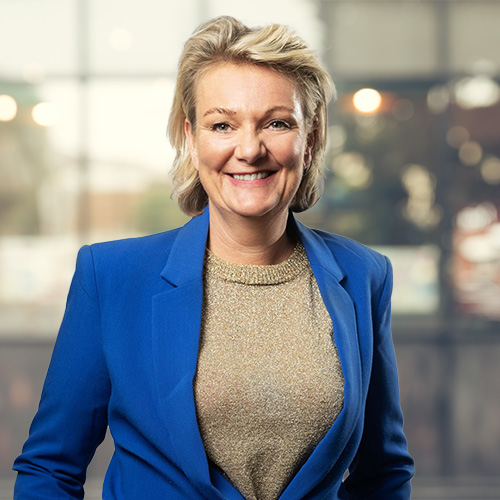
Partnering for mutual progress
As part of our mission to bring revolutionary technologies to the market to solve society’s biggest challenges, TNO partners with organisations that can bring innovations to their fullest value. The recent spin-off of TNO’s Urban Strategy solution shows the power of those partnerships. Together with the City of Amsterdam and other cities around the globe, Urban Strategy’s developers made the platform market-ready and fit-for-purpose. This led to the launch of the spin-off company, Scenexus.
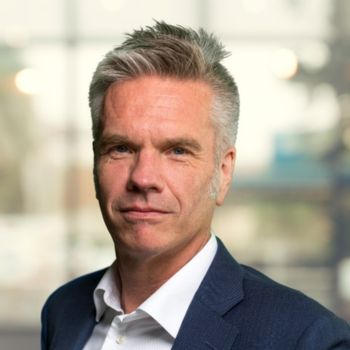
‘We wanted developed the platform according to the specific needs and use cases of the municipalities that would use it.’
From proof to practice
Urban Strategy is a robust, Software-as-a-Service (SaaS) platform that offers insight into the consequences of urban planning decisions before they are made. The underlying algorithms and graphical processing units (GPUs) that power the platform enable it to process thousands of data points in parallel. This makes scenario-building up to 1,000 faster than current state-of-the-art urban planning tools, and drives faster, data-driven decision-making. Cities can complete more projects with fewer delays, and save costs by implementing only those projects that have been proven feasible in Urban Strategy.
During the platform’s development, TNO recognised the need to involve municipalities that would eventually use the SaaS platform. ‘Once we knew the algorithms and models were working as expected, we wanted to further develop the platform according to the specific needs and use cases of the municipalities that would use it,’ explains Jeroen Borst, co-founder and CEO of Scenexus. ‘By partnering with various cities around the world, we could shape the platform to perform the way they needed it to, and add features they found most useful. And, of course, create the security and cloud-based protocols needed to make it market ready. The City of Amsterdam was an ideal partner for this development.’
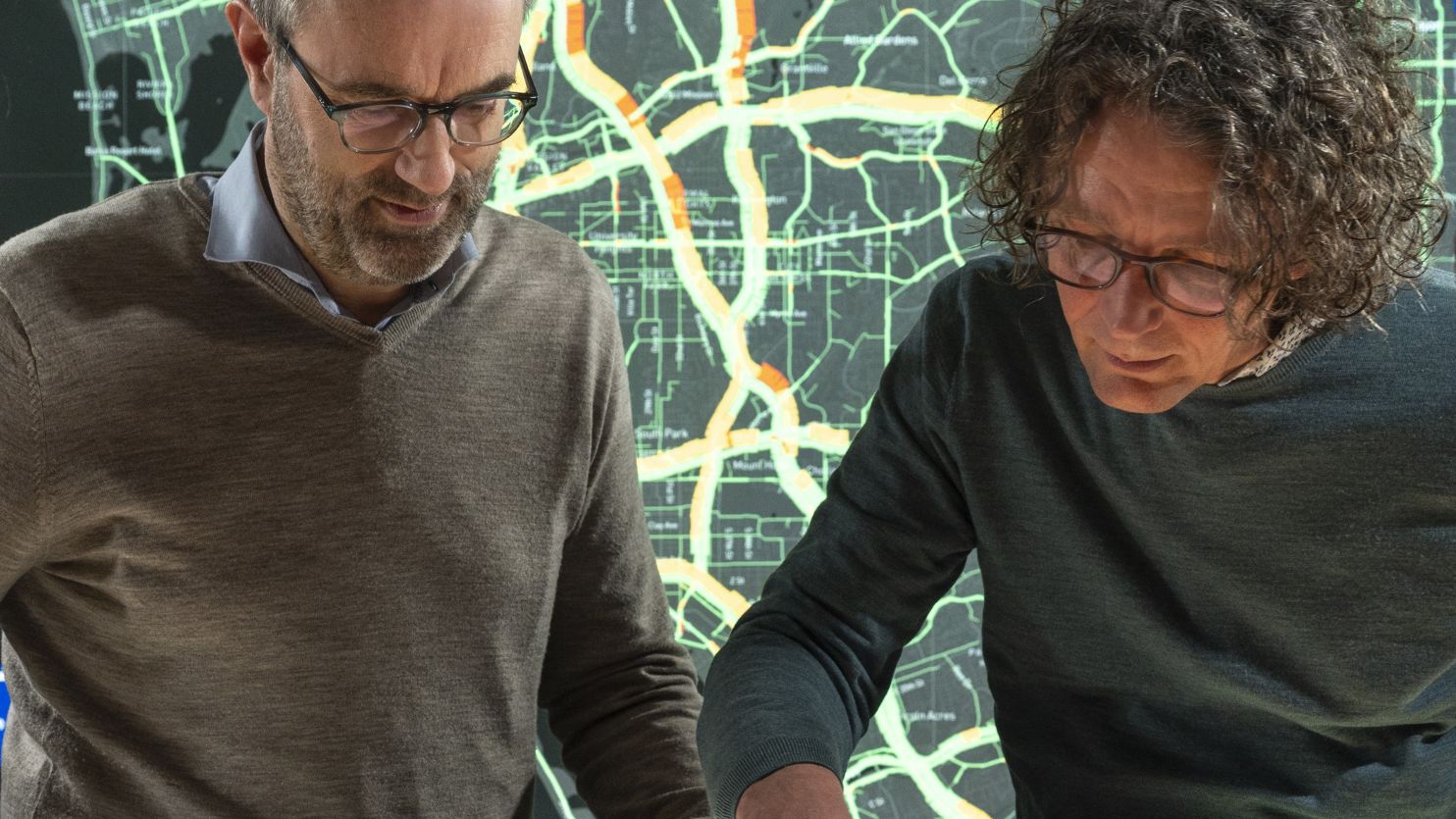
Fuelling the tech transition
In 2014, the City of Amsterdam created the role of Chief Technology Officer (CTO), and Ger Baron is the first person to fulfil this role. ‘Technology impacts every area of our lives, and citizens want their governments to make optimal use of it,’ Ger says. ‘My role is two-fold: first, to identify the ways that technological advances – from Uber to Airbnb and from electric fleets and new power grids to car sharing – are affecting the city, and how they can offer real benefits to it.
Second, we explore the technologies that can improve the city’s operations and help us approach development and opportunities in new and smarter ways. Together with our Innovation team, we examine the technologies that can help us create a more enjoyable, liveable city for all. We partnered with TNO in 2016 to see if the platform could help us address traffic-related planning issues such as congestion and poor air quality.’
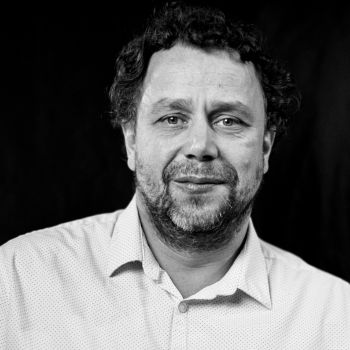
‘We can evaluate a proposed scenario not just on the traffic implications, but also on the impact to liveability, noise reduction, safety, and more.’
Providing reassurance
At first, Ger explains, the city was a bit sceptical about Urban Strategy. ‘For years, we’ve been using trusted modelling platforms and managing a vast amount of data related to the city. But the systems take a long time to process all that information. If we wanted to explore a specific urban planning scenario, it could take several days to get the results. This didn’t exactly encourage teams to explore multiple options. With Urban Strategy, we saw the implications of a proposed scenario in a matter of minutes. This freed up the traffic team and urban planners to explore multiple scenarios in a single day, and gave us the space to consider many options to find an optimal solution. When we found a scenario that looked very promising, we used our traditional platforms to verify and validate that option. Every time, the Urban Strategy results were accurate and on-target.’
What’s more, the platform is multi-faceted and multi-dimensional, so users can see the impact of decision from multiple perspectives. ‘This was a real value-add for the City of Amsterdam,’ Ger says. ‘We can evaluate a proposed scenario not just on the traffic implications, but also on the impact to liveability, safety, noise reduction and more. Important factors like these show the true impact of urban development and the multi-faceted way these decisions impact resident’s lives. We can truly understand the implications of our decisions before we make them.’
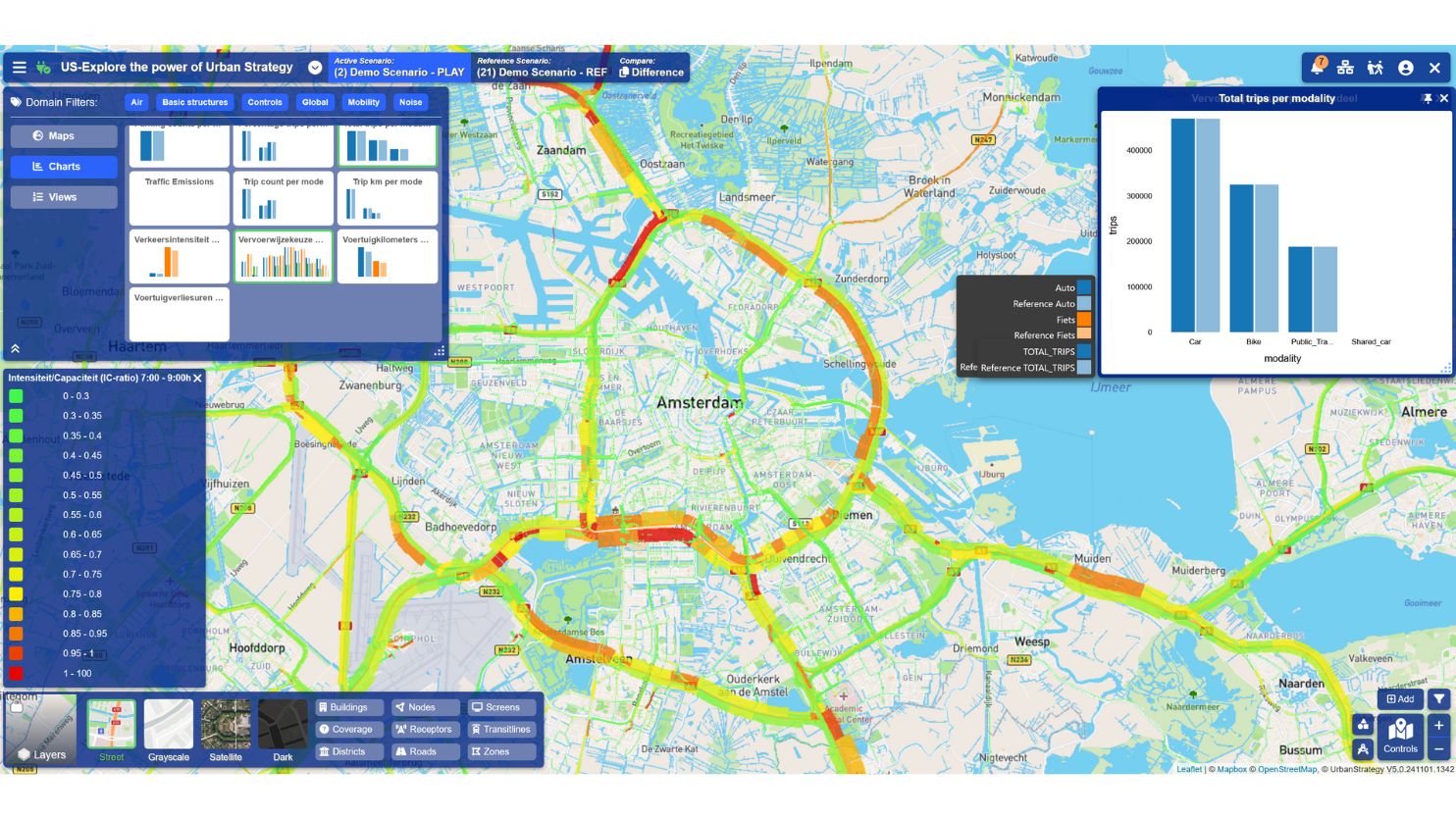
TNO spin-off Scenexus secures 1.6 million euro investment
In January 2025, Scenexus officially spun off as its own, independent company, thanks in part to a €1.6 million investment, led by Lumo Labs. Read about the joint investment here.
Prioritising needs
These multi-dimensional insights help the city make strategic decisions that save a lot of time and money. According to Marcel van Lieshout, Innovation Manager at the City of Amsterdam, it also drives more sensible action. ‘Amsterdam has nearly 1,900 bridges, and a lot of them are in need of repair or reinforcement,’ he says. ‘Using Urban Strategy as a decision-support system, we could prioritise the bridges with the heaviest traffic, and present scenarios to visualise the true impact of the road works. Instead of relying on a limited number of scenarios based on our traditional modelling suites, we could get a more complete picture much faster with Urban Strategy. This led to faster feedback loops and smoother, more data-driven decision-making.’
Jeroen says that Scenexus updates the platform with new tools and capabilities, according to the needs of the cities using it. ‘We've seen a lot of interest in the impact of flooding in urban areas, since that’s a growing concern, and we’re working on this solution now,’ he explains. ‘As cities use the platform, they can indicate the features and capabilities that will help expand Urban Strategy and make it even more useful. They can already evaluate a scenario on things like its effect on air quality, noise, infrastructure resilience, and land usage, and we are always open to exploring new functionalities.’
Globally relevant support
Urban Strategy can be used by any city in the world that needs better, more comprehensive and balanced urban planning. During its development, TNO partnered with cities in North America, Asia, and Europe. ‘So many cities are facing overcrowding, infrastructure challenges, noise pollution, and environmental threats,’ Jeroen explains. ‘We’ve already implemented Urban Strategy in a variety of countries and regions. Once the initial setup is complete, cities can operate the platform completely independently. When they want to add new features or capabilities, they can get in touch and we can help them.’
Ger says that Amsterdam’s contribution to Urban Strategy’s development was beneficial for both sides. ‘In this era of data-driven policy development, Urban Strategy provides the insights that get the job done swiftly and intelligently. Our data feeds those powerful algorithms and the results can be analysed by those who truly understand the implications of each decision. At the same time, cities are often not used to using these tools long-term. Perhaps they get a grant to engage with a Digital Twin platform for a year or two. With Urban Strategy, we took a chance. We engaged our whole team over the long term because we believed strongly in the value of the technology. That has paid off handsomely, as the platform is now fully embedded in our traffic planning process.’
Marcel says that this longer-term engagement took a bit of courage and vision on the city’s part. ‘It’s not just a Digital Twinning tool, it’s a new way of working,’ he explains. ‘We still make use of all of our previous modelling and planning software for verification and validation, so Urban Strategy is a valuable add-on. It gives us a running start to the process, which, for a city, can make all the difference. We’re able to execute more projects, more efficiently, because the initial decision-making is so much more accelerated and fact-based. We know what we can expect before we take a next step.’
Learn more
Interested in learning more about Urban Strategy and how it can help accelerate your urban planning decisions? Visit the website or contact us today to find out more.
Get inspired
TNO spin-off Scenexus secures 1.6 million euro investment


‘We’re able to execute more projects, more efficiently, because the initial decision-making is so much more accelerated and fact-based.’
